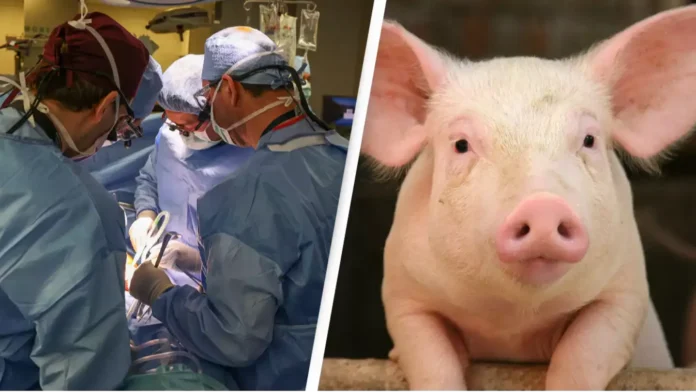In a groundbreaking medical achievement, researchers have successfully performed the first-ever pig kidney transplant in a human. This revolutionary procedure offers hope for addressing the critical shortage of human organs and improving the lives of patients with end-stage kidney failure. The transplantation of genetically engineered pig kidneys into humans, known as xenotransplantation, has the potential to revolutionize organ transplantation and save countless lives. In this article, we will delve into the details of this remarkable medical breakthrough and explore its implications for the future of organ transplants.

The First Successful Pig Kidney Transplant
On March 16, 2024, a team of Harvard Medical School physician-scientists at Massachusetts General Hospital conducted the historic pig kidney transplant. The recipient, Richard Slayman, a 62-year-old man suffering from end-stage kidney failure, received the genetically edited pig kidney in a four-hour surgery. The pig kidney, provided by a biotech company co-founded by HMS scientists, was specifically engineered to be more compatible with humans and reduce the risk of infection.
The success of this transplant marks a significant milestone in the quest to alleviate the critical shortage of human kidneys for patients in need. Despite the unknowns surrounding the long-term results of the procedure, the transplantation of a pig kidney into a human represents a major breakthrough in the field of organ transplantation.
Xenotransplantation: A Solution to Organ Shortages
Organ shortages pose a significant challenge in the field of transplantation medicine. According to the United Network for Organ Sharing, more than 100,000 people in the U.S. are currently on the waiting list for an organ transplant, and 17 people die each day while waiting for a suitable organ. Kidneys are the most in-demand organs, with over 88,000 individuals waiting for a kidney transplant.
Xenotransplantation, the transplantation of organs or tissues from other animals into humans, has emerged as a potential solution to address the shortage of human organs. The use of pig organs, in particular, has gained traction due to their physiological similarities to human organs. Pigs have similar organ sizes and functions, making them suitable candidates for transplantation.
The Promise of Genetically Engineered Pig Organs
To overcome the barriers of compatibility and rejection, researchers have turned to genetic engineering to make pig organs more suitable for transplantation into humans. By genetically editing pig organs, scientists can modify specific genes responsible for rejection and reduce the risk of infection.
In the case of the pig kidney transplant, the organ was sourced from a miniature pig that underwent a record 69 genomic edits. These edits aimed to minimize the chances of rejection and transmission of viruses. By “knocking out” the gene responsible for the biomolecule known as alpha-gal, which triggers rapid antibody-mediated rejection in humans, researchers were able to prevent immediate rejection in all five xenotransplants conducted at Massachusetts General Hospital.
Additionally, the fusion of the pig’s thymus gland, responsible for educating the immune system, with the pig kidney helped prevent novel, delayed immune responses. This combination of genetic modifications and immune system education has paved the way for successful pig kidney transplants.
Short-term Safety and Functionality
The recent successful pig kidney transplant in Richard Slayman demonstrates the short-term safety and functionality of genetically engineered pig organs. Slayman, who had previously received a human kidney transplant that showed signs of failure, received the pig kidney as a lifeline to address his end-stage kidney failure.
The surgery was conducted under an FDA compassionate-use protocol, which allows the use of experimental treatments when no other options are available. The success of this transplant offers hope for millions of patients worldwide suffering from kidney failure, providing an alternative to the arduous and sometimes unattainable process of finding a suitable human organ donor.
Long-term Implications and Future Clinical Trials
While the short-term success of the pig kidney transplant is encouraging, long-term follow-up is necessary to assess the viability and longevity of the transplanted organ. The medical team at Massachusetts General Hospital will closely monitor Slayman’s progress and gather essential data to inform future clinical trials.
The researchers are in discussions with the U.S. Food and Drug Administration (FDA) to plan clinical trials involving transplanted pig kidneys, pediatric hearts, and pig livers designed for external connection to recipients. These trials will provide further insights into the safety, effectiveness, and long-term outcomes of xenotransplantation.
Addressing Ethical and Safety Concerns
The field of xenotransplantation raises ethical and safety concerns that must be carefully addressed. The potential risk of cross-species transmission of viruses, known as zoonotic infections, is a significant concern. Scientists and regulatory authorities must thoroughly evaluate the safety protocols and conduct rigorous testing to ensure the absence of potential infections.
Additionally, ethical considerations surrounding the use of animals for organ transplantation must be taken into account. Striking a balance between the potential benefits to human health and the welfare of the animals involved is crucial in advancing the field of xenotransplantation.

Conclusion: A Promising Future for Organ Transplants
The successful pig kidney transplant in Richard Slayman represents a major breakthrough in the field of organ transplantation. By genetically engineering pig organs and minimizing the risk of rejection and infection, researchers have opened new possibilities for addressing the critical shortage of human organs.
While there are still challenges to overcome, such as long-term viability, ethical concerns, and safety precautions, the future of xenotransplantation holds great promise. Continued research, clinical trials, and collaboration between scientists, medical professionals, and regulatory authorities will pave the way for safer and more accessible organ transplants.
As medical advancements continue to push the boundaries of what is possible, the dream of a world where no individual suffers due to the lack of a suitable organ transplant comes closer to reality. The successful pig kidney transplant serves as a beacon of hope, offering a lifeline to patients in need and inspiring further innovation in the field of organ transplantation.




